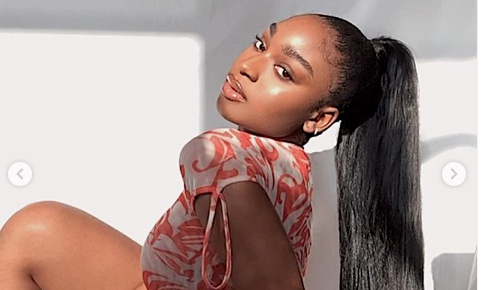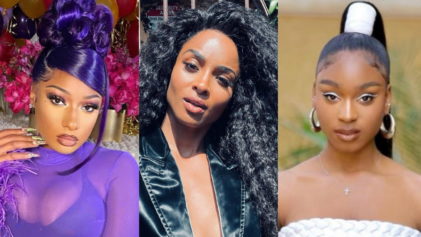Normani has opened up in a new interview with Women’s Health about her low self-confidence while in Fifth Harmony and how she currently prioritizes her mental health.
Fifth Harmony, known for albums such as “Reflections,” Work From Home,” and “Fifth Harmony,” formed in 2012 when five solo contestants from the singing competition show “The X Factor” came together to compete as one group, was the vehicle that put the then-16-year-old Normani in the national spotlight, but the road to stardom would prove bumpy for the teenager.
Often overlooked next to the other members of the girl group, Ally Brooke, Camila Cabello, Dinah Jane and Lauren Jauregui, the singer said that the continual disregard of her abilities was taxing on her confidence and sense of worth before the group disbanded in 2018.

“[It] alters the perception you have of yourself,” she said. “Having certain things happen so blatantly while also feeling like the ‘other’ and being so young and hearing the public compare [us] took a toll on my confidence.”
“For a long time, I didn’t believe in myself because I didn’t feel like I was given the opportunity to,” she told the outlet.
In a January 2019 interview with Billboard, she revealed that as the only Black member of the group, she often felt like “the other one in the room.” She said she would cry at certain recording sessions and was the only member of Fifth Harmony whose voice was primarily used for background vocals.
“It was a subconscious thing,” Normani explained. “You think, ‘Why am I the least-followed in the group?’ Even if you don’t recognize that you’re paying close attention to it, it takes a toll on your confidence. You worry — is it me? Is it because I’m black? Or am I just not talented?”
According to Rolling Stone, she was also targeted by racist online bullies, “fans” who thought Normani had insulted Cabello by calling her “quirky.” The trolls shared Photoshopped pictures of her “being lynched,” while some directed death threats at the performer. Her dad told the publication that she was still scarred from the abuse.
Feeling boxed in as “the dancer,” of the group, Normani’s insecurities began to take hold. “I was devastated,” she admits. “So many things start to go through your mind, like, ‘Maybe this is my fault? What could I have done differently? Am I not working hard enough? Am I not as talented? What’s wrong with my voice?’”
Having four other young women experiencing everything alongside her wasn’t necessarily beneficial, as they couldn’t always supply the comfort she needed.
“They tried to be there for me as best as they could,” she continued. “But I don’t think they had the tools that they needed, because it’s not their experience. I can give them credit for trying to be there for me, but at the same time … the girls don’t experience things the way I did.” Normani described it to Rolling Stone as “them not knowing how to be there for me the way that I needed it because it wasn’t their own experience, and because when they look at me they don’t see me.”
However, now that she’s out of the group, and making her way as a burgeoning solo artist, Normani has adopted more positive methods to keep her mood and confidence sky-high.
“I look at myself in the mirror and manifest and speak things that I want to happen as if they already did as if I’m already that version of myself,” she told Women’s Health. In the interview, she claimed some of the things she says are: “You are one of the greatest entertainers. You are a representation for an entire generation. You have purpose.”
Normani has also solidified a reliable support system composed of her close friends and family, and one particularly notable name — Rihanna.
“It’s alarming when people you’ve looked up to, respect, and who kind of define who you are believe in you,” she said. “But it definitely gives me confidence.”
She admitted to a tendency toward perfectionism, obsessing over every little detail of her music, to her personal detriment. However, over time, the 24-year-old learned to stop stressing and just be secure with who she is.
“For a long time, I was stressed out about checking boxes like, ‘Is this Black enough? Is this pop enough?’ But music started feeling way better when I just went into the studio with the mentality of being Normani,” the singer said about her music since leaving the group, which includes collaborations with artists like Calvin Harris, Nicki Minaj, Megan Thee Stallion, as well as solo music like her single “Motivation.”
“People will always remember how you made them feel and what a record did for them,” she said. “My lyrics have more depth, and they’re more intentional and come from a more authentic place, because I now feel more connected to myself than before.”
“I’m grateful to feel seen and heard and like I can be the voice for so many people. Being a Black woman, I feel we’re so multifaceted and have so much that we’re capable of,” she continued. “It’s really important to show Black girls and Black boys they can be anything they want to be.”
Despite the hurt in her past, Normani said she is ready for the future and whatever it holds.
“Hopefully, in the next few years I’ll have life a little bit more figured out,” she later added. “But if I don’t, I’m OK. I don’t think we ever have it all figured out. But anything that God has placed on my heart, I want to be fearless in.”


